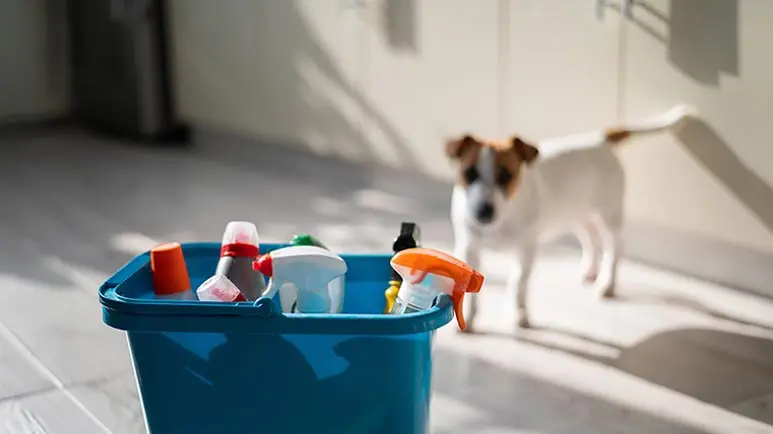Are Your Everyday Cleaners Putting Your Pet at Risk?
No one wants a messy and stinky home, but take caution — your cleaning routine could be creating a toxic environment for your furry family members. Watch out for these hazardous cleaning products and switch to safer, nontoxic ones instead.

STORY AT-A-GLANCE
- Common household cleaning products often contain hazardous chemicals like bleach, ammonia and formaldehyde, which can be toxic to pets when ingested, inhaled or through physical contact
- Signs of toxicity in pets from cleaning products include vomiting, diarrhea, seizures, lethargy, disorientation and, in severe cases, coma or death
- Many "green" cleaning products may still contain toxins at lower levels, so it's important to carefully check the labels
- Safe, nontoxic cleaning alternatives include vinegar and water for floors, lemon juice for windows and stains, and baking soda for disinfecting surfaces
- Pet owners should also be cautious with essential oils (for cats) and pet grooming products. Opt for all-natural options to avoid potential harm to your companion animals
With all the pet hair, paw prints, pee and poop stains/odors, and other messes that pet parents deal with, it’s not uncommon for many to rely on chemical-based products to keep their home spotlessly clean and odor-free. Unfortunately, this comes with unintended consequences to your pet’s health (as well as yours).
In fact, the American Society for the Prevention of Cruelty to Animals (ASPCA) Animal Poison Control Center says that cleaning products make up 8.3% of calls they receive regarding pet poisoning.1 If you truly want to create a safe and toxic-free haven for your family, including your furry family members, you may need to reevaluate your cleaning habits and eliminate the products wreaking havoc on your pet’s well-being.
Your Everyday Cleaning Products Can Contain Hazardous Ingredients
Most households use a variety of everyday cleaning products for different purposes. Glass cleaners, floor disinfectants, multipurpose cleaners, laundry detergents, and odor and pet stain removers are just some examples. However, these products contain a variety of chemical agents that can be toxic to dogs and cats (and even to humans). These include:2
- Bleach — Used in bathroom cleaners, bleach is a powerful bleaching agent and disinfectant that is dangerous when inhaled, ingested or if it comes into contact with skin.
- Ammonia — Found in window and glass cleaners, oven cleaners and stainless steel cleaners, this chemical is a mixture of nitrogen and hydrogen. Ingestion, inhalation or physical contact can all be hazardous to pets.
- Hydrogen peroxide — Color-safe bleaches typically use this ingredient. According to the website Catster, “Hydrogen peroxide … can cause inflammation and ulceration of the gastrointestinal tract if ingested and skin irritation and rashes if a cat comes into contact with it.”3
- Isopropyl alcohol — Disinfecting wipes, hand sanitizers and multi-surface cleaners use this ingredient as a disinfectant. While it is safer than other chemicals when it comes into contact with skin, it can be dangerous when ingested.
- Phenol — This aromatic organic compound is used in disinfectants like Lysol, as well as in laundry detergents.
- Formaldehyde — When added to dish soaps and laundry soaps, formaldehyde acts as a disinfectant and preservative. However, when ingested it can cause the gastrointestinal tract to erode. Physical contact can cause eye and upper respiratory tract irritation as well. It’s also a known carcinogen.
- Phthalates — Aside from being used in plastic products, phthalates are added to cleaning products for their fragrance. Carpet fresheners, air fresheners and fabric softeners usually contain phthalates.
- Essential oils — These are often added to products for fragrance, but some people also use them in diffusers to add fragrance to their home. However, essential oils can be toxic, particularly to cats. When they get into contact with concentrated essential oils, they can be at risk of liver failure, seizure and even death.
Signs of Toxicity from Cleaning Products
Commercial cleaning products may appear harmless, but did you know that they off-gas toxic fumes that can pollute your indoor air? The more you use these products, the greater the buildup of toxins in your home. Pets who are sensitive to these airborne pollutants often experience symptoms like breathing problems and eye irritation.
What’s more, cats and dogs usually eat stuff off the floor or lick their paws after walking around, causing them to ingest floor cleaners that you use. If swallowed, they may experience symptoms like:
- Vomiting
- Diarrhea
- Seizures
- Lethargy
- Disorientation
- Pawing at the mouth
- Excess drooling
The severity of these symptoms may depend on the product’s concentration, the amount your pet was exposed to and the method of exposure (was the product ingested? Inhaled?) In worse case scenarios, it can lead to coma or even death.
Replace Your Toxic Cleaning Products with Safe, Nontoxic Cleaners
Most pet parents recognize the potential dangers of toxic chemical cleaners to pets, and have switched to “green” cleaning solutions. However, a word of caution about these products — despite being labeled “green,” some still contain toxins, although they may still contain toxins at lower levels compared to commercial cleaners. So make sure you do your homework when buying these products, and always check the label.
The good news is there are some simple, inexpensive and nontoxic products that you can use in place of these chemical-loaded cleaning products. Below are some alternatives to help you get started:
- Instead of a floor cleaner, use vinegar and water — This will work for wood, ceramic, linoleum or vinyl flooring. Mix one cup of vinegar to one gallon of warm water and use it to mop your floor. There’s no need to rinse after mopping, but if you want to give your floor a nice shine, you can mop it with straight club soda. For stains on vinyl floors, use undiluted lemon juice — add it to a clean cloth and rub on the stain.
- Instead of window cleaners, use lemon juice and water — Mix four tablespoons of lemon juice in half a gallon of water. Apply it using a clean lint-free clothing for best results.
- Remove mildew, grease and other stains with lemon juice — Spray it on the area and use a stiff cleaning brush to rub the stain out.
- Disinfect surfaces with this solution — Mix 2 cups of water, 3 tablespoons of mild liquid soap and 25 drops of tea tree oil, which has antifungal and antibacterial properties.
- Use baking soda to clean and disinfect kitchen and bathroom surfaces — Simply dust the surfaces with baking soda, then wipe with a moist cloth or sponge. You can add salt to help remove tough grime.
- Boiling water and baking soda can help unclog a drain — Pour half a cup of baking soda in the drain, then pour 2 cups of boiling water. For tough clogs, add half a cup of vinegar. Cover the drain tightly while the mixture is fizzing up. Once it stops, flush with a gallon of boiling water.
- Polish wooden furniture with olive oil and lemon juice — Mix two parts olive oil with 1 part lemon juice, and apply to your furniture with a soft cloth, Coconut oil also works great.
Lastly, remember to check your pet’s grooming products as well, as they could contain chemicals and heavy scents that can be harmful to pets. Switch to an all-natural pet shampoo and conditioner that do not have harsh scents that can cause itching and irritate on your pet’s skin.











